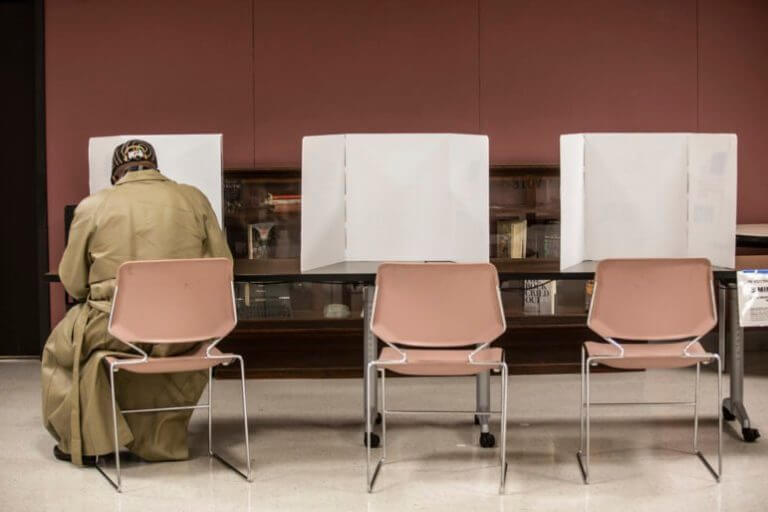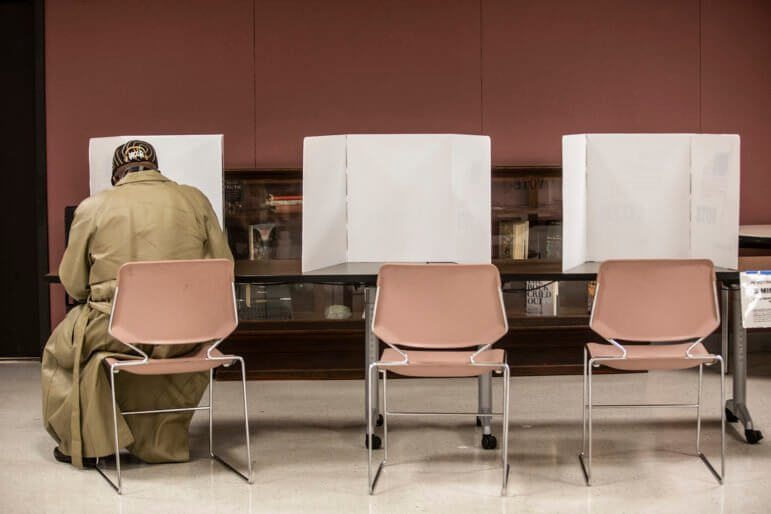

Eric J. Shelton, Mississippi Today/ Report for America
About 235,000 Mississippians can’t vote because of felony convictions – the highest percentage in the nation.
Mississippi now denies a higher percentage of its residents the right to vote because of felony convictions than any state in the country, according to a recent study.
In Mississippi, 235,150 people, or 10.6% of the state’s voting age population, have lost their right to vote, according to a recent study by The Sentencing Project, a national nonprofit that advocates for voting and criminal justice issues. Since 2016, Mississippi has moved from second to first highest percentage in the nation.
Mississippi also has the third highest percentage of disenfranchised Black residents of any state in the nation: 130,500 Black Mississippians, or 16% of that voting age population, cannot vote. Mississippi is third to Wyoming (36.22%) and Tennessee (21.65%).
Both Mississippi percentages are well above national averages: total felony disenfranchisement is 2.3% nationally, and the national average for disenfranchised African Americans is 6.3%.
The Mississippi Constitution, written by white lawmakers in 1890, contains a list of crimes for which a person convicted of a felony loses voting rights. The original list of crimes deemed to be disenfranchising has been updated by official opinions from the attorney general’s office through the years to coincide with modern criminal law.
Disenfranchising crimes include: arson, armed robbery, bigamy, bribery, embezzlement, extortion, felony bad check, felony shoplifting, forgery, larceny, murder, obtaining money or goods under false pretense, perjury, rape, receiving stolen property, robbery, theft, timber larceny, unlawful taking of a motor vehicle, statutory rape, carjacking and larceny under lease or rental agreement.
There are other crimes, such as crimes connected with the sale of drugs, where a person convicted of a felony does not lose the right to vote and actually is eligible to vote while incarcerated.
Felony disenfranchisement language was added to the state Constitution in the 1890s as one of several attempts to prevent Black Mississippians from voting. With African Americans still being disproportionately convicted of crimes, that continues to be the effect of the disenfranchisement language.
A 2018 analysis by Mississippi Today found that 61% of the Mississippians who have lost their rights to vote are African American, despite the fact that African Americans represent 36% of the state’s total voting-age population.
Most states restore voting rights for people convicted of felonies at some point after they finish their sentence or complete their parole and probation. But in Mississippi, people convicted of many crimes — some of the crimes violent, and some not — never have their rights restored unless done so by a two-thirds vote of both chambers of the Legislature or by a gubernatorial pardon.
READ MORE: Not all ex-felons are barred from voting in Mississippi, but no one is telling them that.
Legislation to automatically restore voting rights to felons at some point after serving their sentence is introduced most years in the Legislature and in past years has passed one chamber, but died in the other. There are federal lawsuits pending claiming that permanent disenfranchisement violates the U.S. Constitution.
In the 2020 session, the Legislature restored the right to vote to six felons. In 2019, legislators restored suffrage to 16 – the most since 2004 when voting rights were restored to 34. Between 2000 and 2020, the Legislature averaged restoring voting rights to 7.3 felons per year.
In a 2016 study, The Sentencing Project estimated that Florida was first in the nation for total felony disenfranchisement at 10.4%, and Mississippi was second at 9.6%.
Florida voters approved a citizen-sponsored initiative in 2018 to restore voting rights to most after their sentences were completed. Still, 7.7% of Floridians convicted of felonies have not had their rights restored in large part because they have not paid off fines and fees mandated by the Florida Legislature.
But no such major reform has passed in Mississippi.
“Mississippi is one of those states with indefinite disenfranchisement, essentially lifetime disenfranchisement,” said University of Minnesota professor Christopher Uggen, the lead researcher on the Sentencing Project report. “Many of the other states have pared back those restrictions… In Mississippi, it is for life.
“That means if you had a felony conviction in 1972 you are still locked out of that process without some extraordinary effort,” Uggen continued. “And frankly the number of restorations in Mississippi, the people who go through the formal process, is tiny. Clearly, in my view, this is a vestige of the long civil rights process where we had very restrictive laws in the 19th century, and some of them exist today.”
The Sentencing Project held a recent conference call to release the report that detailed how the number of disenfranchised felons had dropped from more than 6.1 million in 2016 to about 5.2 million in 2020 as states like Florida and others have reformed their laws. In many states, governors have issued executive orders restoring rights to thousands of felons.
Shahur Abdullah, who served 41 years in prison in Nebraska and founded JustUs 15 Vote, had his rights restored when the state of Nebraska changed its law from a permanent ban to a ban for two years after being released from prison. He said voting was particularly important to him because his father, a Mississippi native, was not able to vote in his home state after fighting for the United States in the Korean Conflict. Abdullah’s father later moved his family from Philadelphia, Mississippi, to Nebraska.
“Given my own personal history, and this country’s history of systemic racism and white supremacy, I felt the full weight of my ancestors behind me when I voted for the first time,” Abdullah said. “We ought to remember that this country was founded on the principle of no taxation without representation. I was immediately required to pay taxes upon my release from incarceration, but my vote wasn’t accepted. This should never be the case.”
The post Study: 11% of all Mississippians, 16% of Black Mississippians can’t vote because of felony convictions appeared first on Mississippi Today.
- Jackson officials back House proposal to create new water utility board, despite some locals’ concerns - February 16, 2026
- Speaker Jason White: House ‘not afraid’ of school choice special session - February 16, 2026
- ‘Primary Trust’ at New Stage has a message for this moment - February 16, 2026